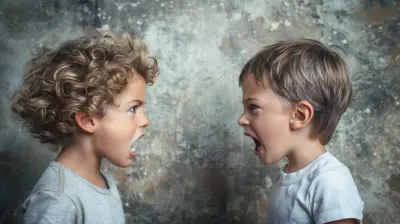The Power of Words: Books That Teach Parents How to Communicate Effectively
4 August 2025
Let’s be real—parenting is hard. You can prepare as much as you want, read countless blogs (like this one!), and ask every parent you know for advice, but when your toddler throws a tantrum in aisle five or your teen gives you the silent treatment, the only thing that can truly save the day... is communication.
And not just any communication—the right kind. The kind that builds trust, encourages honesty, and helps your child grow emotionally strong. But here’s the thing: no one is born knowing how to talk to kids at every stage of their development. That’s where books become a parent’s secret weapon.
In this article, we’re diving deep into the power of words and highlighting some life-changing books that teach parents how to communicate effectively. These books aren’t just filled with tips—they’re full of heart, science, and real-life tools you can start using today.

Why Communication Matters More Than You Think
Think of communication as the foundation of your entire parent-child relationship. Without strong communication, misunderstandings build up like dust under the couch—easy to ignore at first, but eventually overwhelming.Good communication:
- Builds trust and emotional connection
- Helps prevent and resolve conflicts
- Boosts your child’s self-esteem
- Teaches problem-solving and emotional regulation
- Makes your parenting more intentional and less reactive
When you really think about it, every meltdown, every power struggle, every “why won’t they listen?” moment traces back to how we talk to our kids—and how they talk back.

The Science Behind Talking and Listening
It’s not just fluff—there’s real science backing up the importance of effective communication. According to brain development research, the way parents speak to children literally shapes how their brains grow.When parents respond with empathy, validate feelings, and offer predictable, calm responses, children thrive. Their brains become wired for emotional resilience, empathy, and confidence. On the flip side, harsh or dismissive communication can trigger toxic stress and emotional shutdown—even if we’re doing it unintentionally.
But hold up—this isn’t about guilt. It’s about growth. We can shift how we speak. And books? They’re excellent coaches.

Top Books That Teach Parents How to Communicate Effectively
So, which books are worth grabbing a highlighter for? Here’s a curated list of some of the most powerful and practical reads that will transform how you connect with your child—whether they’re two or sixteen.1. “How to Talk So Kids Will Listen & Listen So Kids Will Talk” by Adele Faber & Elaine Mazlish
Why it’s a game-changer:This book is basically the parenting communication bible. Been around for decades, and for good reason—it works. The strategies are ridiculously simple but wildly effective.
Expect to learn:
- How to acknowledge your child’s feelings without dismissing them
- Why threats and punishments backfire
- How to set limits while still being kind
Real-life gem: Instead of yelling “Stop crying, it’s not a big deal,” you learn to say, “You’re upset because your Lego broke. That stinks. Want help fixing it?” It’s like flipping a switch from chaos to calm.
2. “The Whole-Brain Child” by Dr. Daniel J. Siegel & Dr. Tina Payne Bryson
Why it’s essential:If you ever wished you could understand what’s going on inside your child’s head during those baffling mood swings, this book delivers. It combines neuroscience and parenting in a way that makes sense.
You’ll learn:
- How your child’s brain actually works at different ages
- Why logic doesn’t always work during emotional meltdowns
- Easy “connect and redirect” strategies for tough moments
Best part? You won’t feel like a bad parent for losing your cool. This book makes you feel seen and gives you a plan for next time.
3. “Parenting with Love and Logic” by Charles Fay & Foster Cline
Why it’s different:This book offers a strong focus on teaching responsibility through natural consequences without yelling or nagging. Kids learn better when they make mistakes and feel supported rather than lectured.
It helps you:
- Set clear, consistent boundaries
- Encourage wise decision-making
- Stay calm instead of controlling
Notable tool: Saying “I love you too much to argue,” instead of escalating the situation. It’s weirdly effective—and a total sanity saver.
4. “No-Drama Discipline” by Dr. Daniel J. Siegel & Dr. Tina Payne Bryson
Why it’s a must-read:Another gem from Siegel and Bryson, this one cracks the code on discipline. Spoiler: It’s not about punishment—it’s about teaching.
Inside, you’ll find:
- The difference between discipline and punishment
- How to stay connected and hold your child accountable
- What to do in the moment when everyone’s losing it
One killer takeaway: “Connection before correction.” That one sentence can seriously shift the mood in your home.
5. “Raising An Emotionally Intelligent Child” by John Gottman
Why it hits home:Emotional intelligence (EQ) is a stronger predictor of success than IQ—not just in school, but in life. Gottman teaches parents how to be “emotion coaches,” helping kids name, understand, and manage their feelings.
This book teaches you:
- How to validate your child’s emotions (even when they seem irrational)
- The five steps to emotional coaching
- How to handle conflict with empathy
Bonus: This book helps adults grow their own EQ too. Yeah, we need it just as much.
6. “Siblings Without Rivalry” by Adele Faber & Elaine Mazlish
Why it’s gold for multi-kid households:If you’ve got more than one child, you’ve probably heard “That’s not fair!” on repeat. This book helps you shift from refereeing fights to fostering respect.
Key lessons include:
- How to avoid comparisons between kids
- Ways to encourage cooperation instead of competition
- Scripts that actually diffuse sibling tension
Magic moment: Learning that saying “You’re both special to me in different ways” goes a lot further than “Stop fighting!”
7. “Listen: Five Simple Tools To Meet Your Everyday Parenting Challenges” by Patty Wipfler & Tosha Schore
Why it's a fresh voice:This book emphasizes the healing power of being truly heard. It's about more than saying the right words—it’s about creating space for your child’s emotions and your own.
What you’ll love:
- A practical approach to listening (even during tantrums!)
- Ideas for self-care and finding support
- A compassionate tone that feels like a warm hug
Highlight takeaway: Sometimes doing less—saying less—actually helps your child express more.
How to Apply Book Wisdom In Real Life
Okay, so the books are great—but how do you make this stuff stick? Well, it’s like going to the gym. You don’t just read about squats—you do them.Here’s how to start:
- Pick one book at a time. Don’t overwhelm yourself.
- Underline and highlight like crazy. You’re allowed!
- Try one new strategy a week. Small changes = big results.
- Talk to your partner or co-parent. Get on the same page.
- Be forgiving—with yourself and your child. You're both learning.
And don’t forget—practice is where the magic happens.
A Few Communication Tips to Keep in Your Back Pocket
Even if you haven’t read a single one of those books (yet), here are a few quick reminders you can start using now:- Listen more than you talk. Kids want to feel heard.
- Validate feelings. “I see you're upset,” goes a long way.
- Pause before reacting. Take a breath. It works.
- Use “I” statements. “I feel worried when you...” instead of “You never...”
- Ask instead of tell. “What do you think we should do here?”
Communication isn’t about perfection—it’s about connection.
Final Thoughts: Your Words Shape Your Child’s World
Being a parent means being a guide, a coach, a safe space. And the most powerful tool you have in all of those roles? Your words.The way we talk to our kids becomes the voice they use to talk to themselves later in life. That alone is reason enough to want to level up our communication game.
Books can help. They aren’t just information—they’re transformation. Each page you turn is another step toward a more peaceful, trusting, and respectful relationship with your child.
So grab a cup of coffee (or hide in the bathroom for five minutes—we won’t judge), open one of these books, and give yourself the gift of better communication. Your kids will thank you. Maybe not today, but one day. And when they do, it’ll be because you chose to change how you said what needed to be said.
all images in this post were generated using AI tools
Category:
Parenting BooksAuthor:

Karen Hurst
Discussion
rate this article
2 comments
Lauren McLain
Words weave bonds; nurture, connect, grow.
November 19, 2025 at 5:05 PM

Karen Hurst
Absolutely! Words truly are the threads that strengthen our relationships and foster understanding. Thank you for sharing!
Ranger Hodge
Words shape our world—choose them wisely! This insightful list proves that mastering communication is the secret weapon every parent needs for nurturing strong, meaningful connections.
August 6, 2025 at 3:27 PM

Karen Hurst
Thank you! I'm glad you found the list valuable. Words truly do have the power to shape relationships and foster deeper connections.


